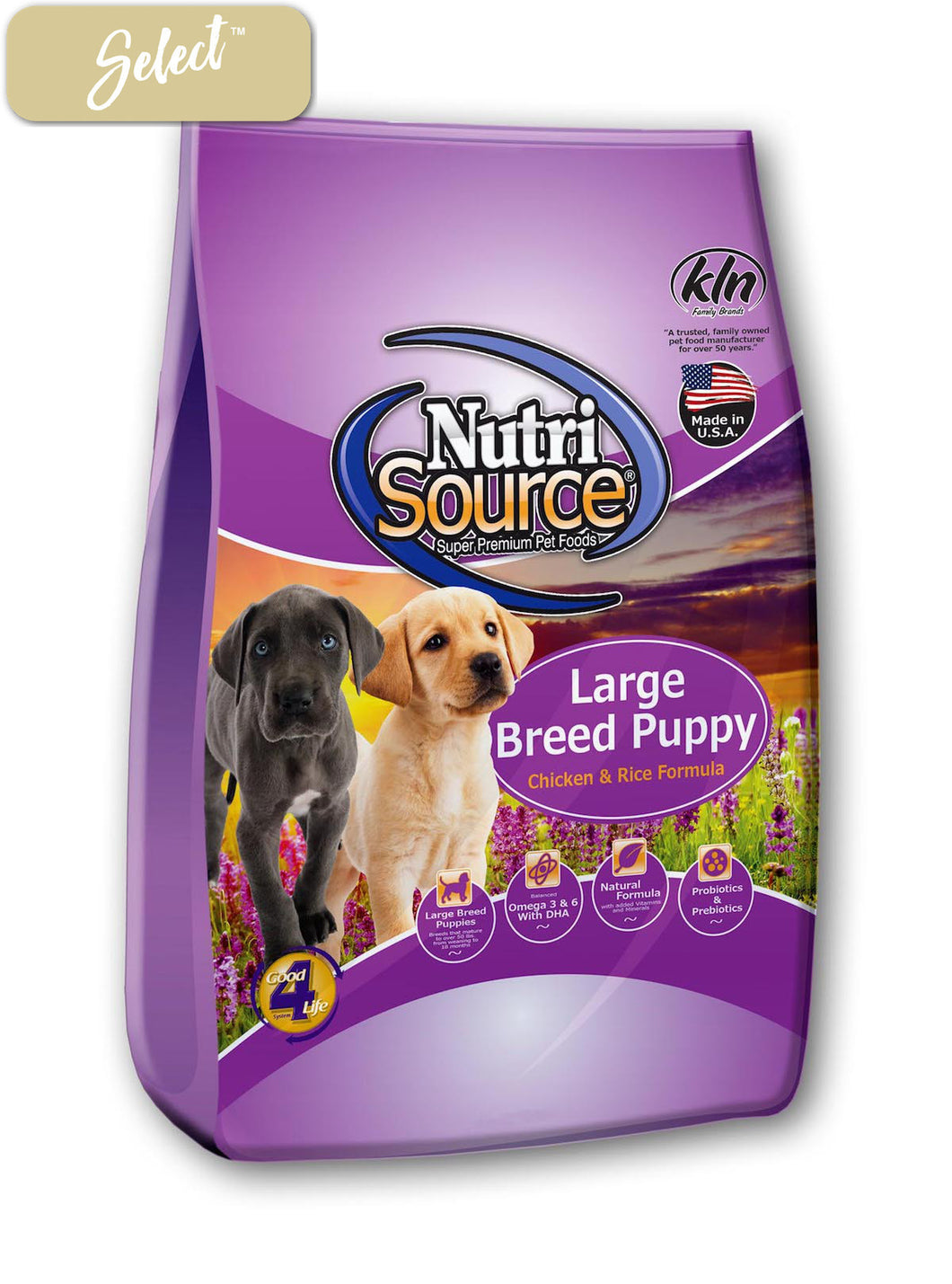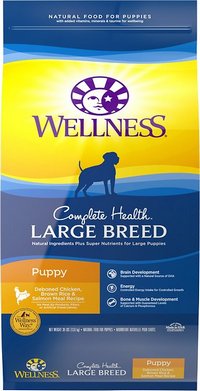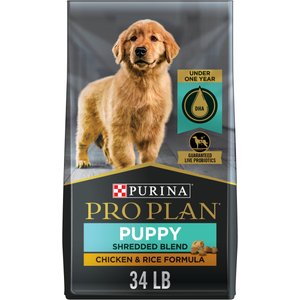As an Amazon Associate, I earn from qualifying purchases
The best large breed puppy food includes brands like Royal Canin, Blue Buffalo, and Hill’s Science Diet. They provide balanced nutrition tailored for large breeds.
Large breed puppies have unique dietary needs. Their rapid growth requires precise nutrition to support bone health and muscle development. High-quality puppy food for large breeds includes essential nutrients like calcium, phosphorus, and omega fatty acids. These nutrients help in maintaining a healthy weight and preventing joint issues.
Brands such as Royal Canin, Blue Buffalo, and Hill’s Science Diet offer specially formulated options. These foods cater to the specific needs of large breed puppies, promoting overall health and well-being. Choosing the right food ensures your puppy grows into a healthy and strong adult dog.

Importance Of Nutrition
Nutrition is crucial for your large breed puppy. A proper diet ensures they grow healthy and strong. This section explores why nutrition matters so much.
Early Development
During early development, your puppy needs the right nutrients. Proper nutrition supports their rapid growth and bone development.
- Protein: Essential for muscle growth.
- Calcium: Supports bone strength.
- Fatty Acids: Important for brain development.
A balanced diet prevents growth-related issues. It also ensures a stable weight.
Long-term Health
Good nutrition impacts your puppy’s long-term health. Proper diets reduce risks of chronic diseases.
| Nutrient | Benefit |
|---|---|
| Fiber | Supports digestion. |
| Antioxidants | Boosts the immune system. |
| Omega-3 | Improves skin and coat health. |
A well-fed puppy is less prone to obesity. They also have more energy and vitality.
Key Nutrients For Large Breeds
Choosing the best food for your large breed puppy is crucial. Large breeds have special dietary needs for growth and health. This section covers the key nutrients essential for large breed puppies.
Protein Needs
Protein is vital for muscle development and energy. Large breed puppies need more protein than smaller breeds. Aim for a minimum of 22% protein in their food. Look for high-quality sources like:
- Chicken
- Beef
- Fish
Calcium And Phosphorus
Calcium and phosphorus are critical for bone growth. The right ratio of these minerals helps prevent joint issues. Large breed puppies should have a calcium-to-phosphorus ratio of about 1.2:1. Check the labels for this information.
| Mineral | Recommended Ratio |
|---|---|
| Calcium | 1.2% |
| Phosphorus | 1% |
Healthy Fats
Healthy fats are important for energy and coat health. Large breed puppies need fats from sources like:
- Fish oil
- Chicken fat
- Flaxseed
Ensure the food contains at least 8% fat. This helps in proper growth and development.
Top Ingredients To Look For
Choosing the right food for your large breed puppy is crucial. The right diet helps them grow strong and healthy. Knowing the best ingredients can guide you. Here are the top ingredients to look for in the best large breed puppy food.
High-quality Proteins
Proteins are the building blocks of your puppy’s body. Look for high-quality proteins such as chicken, beef, or fish. These proteins support muscle growth and repair. Avoid foods with protein by-products. These are less nutritious and can harm your puppy’s health.
Whole Grains
Whole grains provide essential nutrients and energy. Good options include brown rice, oats, and barley. Whole grains also aid in digestion. They keep your puppy feeling full and satisfied. Avoid grains like corn and wheat. They can cause allergies and are less nutritious.
Essential Vitamins
Vitamins are crucial for your puppy’s overall health. Look for foods rich in essential vitamins like A, C, and E. These vitamins support the immune system. They also aid in bone development and skin health. Ensure the food contains a balanced mix of vitamins for optimal growth.
| Ingredient | Benefits |
|---|---|
| Chicken | High-quality protein for muscle growth |
| Brown Rice | Whole grain for energy and digestion |
| Vitamin A | Supports vision and immune health |
Ingredients To Avoid
Choosing the best large breed puppy food is crucial for your puppy’s growth. Certain ingredients should be avoided to ensure your puppy’s health and development. Below, we discuss the key ingredients to avoid in large breed puppy food.
Artificial Additives
Artificial additives can be harmful to your puppy’s health. These include artificial colors, flavors, and preservatives. They can cause allergic reactions and long-term health issues.
Common artificial additives to avoid:
- Artificial Colors (e.g., Blue 2, Red 40)
- Artificial Flavors
- Preservatives (e.g., BHA, BHT, Ethoxyquin)
By-products
By-products are low-quality ingredients that offer little nutritional value. They often include parts of animals not suitable for human consumption. By-products can lead to digestive issues and poor nutrient absorption.
Common by-products to avoid:
- Poultry By-Products
- Meat By-Products
- Animal Digest
Excessive Fillers
Excessive fillers are used to bulk up the food with low-cost ingredients. These fillers provide minimal nutrition and can lead to weight gain and other health issues.
Common fillers to avoid:
- Corn
- Wheat
- Soy
| Ingredient | Reason to Avoid |
|---|---|
| Artificial Colors | Can cause allergies |
| Artificial Flavors | Offer no nutritional value |
| Poultry By-Products | Low nutritional quality |
| Corn | Minimal nutrition, potential allergens |
Wet Vs. Dry Food
Choosing the right food for your large breed puppy is crucial. The debate between wet and dry food often leaves pet owners puzzled. Each type has its own advantages. Understanding these can help you make an informed decision for your furry friend.
Pros Of Wet Food
Wet food can be very beneficial for large breed puppies. Here are some key points:
- Hydration: Wet food contains more moisture. This helps keep your puppy hydrated.
- Palatability: Wet food is often more flavorful. Puppies usually find it tastier.
- Ease of Eating: Wet food is softer. It is easier for puppies to chew.
- Higher Protein: Wet food often has more protein. This supports muscle growth.
Benefits Of Dry Food
Dry food also offers several benefits for large breed puppies. Here are some important points:
- Dental Health: Dry food helps clean teeth. It reduces plaque and tartar buildup.
- Convenience: Dry food is easier to store. It doesn’t require refrigeration.
- Cost-Effective: Dry food is usually cheaper. It’s more budget-friendly for pet owners.
- Long Shelf Life: Dry food lasts longer once opened. It stays fresh for weeks.
| Feature | Wet Food | Dry Food |
|---|---|---|
| Hydration | High | Low |
| Flavor | More flavorful | Less flavorful |
| Chewing Ease | Easy | Harder |
| Protein Content | Higher | Lower |
| Dental Health | Less effective | More effective |
| Storage | Requires refrigeration | Room temperature |
| Cost | More expensive | Less expensive |
| Shelf Life | Shorter | Longer |

Recommended Brands
Choosing the best large breed puppy food ensures your furry friend grows strong and healthy. Here are some recommended brands that offer high-quality nutrition for large breed puppies.
Brand A
Brand A is known for its balanced nutrition. It includes essential vitamins and minerals for large breed puppies.
- High protein content for muscle growth.
- Calcium and phosphorus for strong bones.
- Contains DHA for brain development.
- Free from artificial preservatives.
Brand B
Brand B offers tailored nutrition for large breeds. It focuses on joint health and weight management.
| Nutrient | Benefit |
|---|---|
| Glucosamine | Supports joint health |
| Omega-3 fatty acids | Promotes healthy skin and coat |
| Lean proteins | Helps maintain a healthy weight |
Brand C
Brand C is popular for its natural ingredients. It avoids fillers and artificial additives.
- Real meat as the first ingredient.
- Whole grains for energy.
- Fruits and vegetables for antioxidants.
- Probiotics for digestive health.
These brands offer the best options for large breed puppy food. They ensure your puppy gets the nutrition needed for a healthy start in life.
Feeding Guidelines
Feeding large breed puppies requires special care. Proper nutrition helps them grow strong and healthy. This section covers essential guidelines to help you.
Portion Control
Large breed puppies grow quickly. Controlling portions is crucial to avoid overfeeding. Overfeeding can lead to obesity and joint problems.
Consult your vet for portion recommendations. Generally, follow the guidelines on the food package.
| Age (Months) | Weight (lbs) | Daily Portion (cups) |
|---|---|---|
| 2-3 | 10-20 | 2-3 |
| 4-5 | 20-50 | 3-4 |
| 6-12 | 50-100 | 4-6 |
Feeding Schedule
Establishing a regular feeding schedule helps your puppy’s digestion. Stick to set meal times. This also prevents overeating.
For young puppies, feed them three to four times a day:
- Morning: 7:00 AM
- Midday: 12:00 PM
- Afternoon: 5:00 PM
- Evening: 8:00 PM
As they grow, reduce meals to twice daily:
- Morning: 7:00 AM
- Evening: 7:00 PM
Always provide fresh water alongside meals. Keep the feeding area clean and safe.
Common Health Concerns
Raising a large breed puppy brings unique health challenges. Ensuring the right diet can help manage these concerns. This section covers common health issues large breed puppies face.
Joint Issues
Large breed puppies are prone to joint problems. Hip dysplasia and elbow dysplasia are common in these breeds. It’s crucial to provide food rich in glucosamine and chondroitin. These nutrients support healthy joints.
A balanced diet helps maintain proper growth. Rapid growth can stress the joints. Controlled calcium and phosphorus levels are essential. Too much calcium can lead to joint issues.
Weight Management
Large breed puppies can gain weight quickly. Obesity strains their joints and organs. Feeding them the right amount is vital. Use the feeding guidelines on the food package.
Opt for food with high protein and low fat. Protein supports muscle growth, while low fat prevents excess weight gain. Monitor your puppy’s weight regularly.
| Nutrient | Benefit |
|---|---|
| Protein | Supports muscle growth |
| Glucosamine | Protects joint health |
| Low Fat | Prevents weight gain |
| Controlled Calcium | Ensures proper bone development |
Choose food specifically formulated for large breed puppies. This ensures they get the right nutrients. Always consult with your vet for personalized advice.
Transitioning To Adult Food
Transitioning your large breed puppy to adult food is crucial. Proper timing ensures they receive the right nutrients. This guide helps you make the switch smoothly.
When To Switch
Large breed puppies grow differently than small breeds. Typically, they need puppy food until they reach 12 to 18 months old. Consult your veterinarian for specific advice. Signs your puppy is ready include:
- Steady growth rate
- Maintaining a healthy weight
- Decreased energy levels
Monitoring these signs helps determine the best time to switch.
How To Transition
Transitioning to adult food should be gradual. A sudden change can upset their stomach. Follow these steps for a smooth transition:
- Mix 25% adult food with 75% puppy food for 3 days.
- Increase to 50% adult food and 50% puppy food for the next 3 days.
- Mix 75% adult food with 25% puppy food for the following 3 days.
- Finally, feed 100% adult food.
This gradual approach helps their digestive system adjust. Always monitor your puppy’s reaction to the new food.
Important: Ensure the adult food is formulated for large breeds. Large breed formulas provide the right nutrients for their size.

Frequently Asked Questions
What Is The Best Food For Large Breed Puppies?
The best food for large breed puppies contains balanced nutrients, high-quality protein, and controlled calcium levels. Look for reputable brands with large breed-specific formulas.
How Often Should I Feed My Large Breed Puppy?
Feed your large breed puppy 3-4 times a day. This helps maintain stable energy levels and supports healthy growth.
Can Large Breed Puppies Eat Adult Dog Food?
No, large breed puppies need specialized food. Adult dog food lacks the specific nutrients required for their growth and development.
How Much Should A Large Breed Puppy Eat?
The amount varies by age, weight, and activity level. Follow the feeding guidelines on the puppy food packaging for accurate portions.
Conclusion
Choosing the best large breed puppy food is essential for your dog’s growth and health. Focus on high-quality ingredients and balanced nutrition. Always consult your veterinarian for personalized recommendations. Providing the right diet will ensure your puppy grows into a healthy, happy adult dog.
Keep their dietary needs a priority.
As an Amazon Associate, I earn from qualifying purchases

